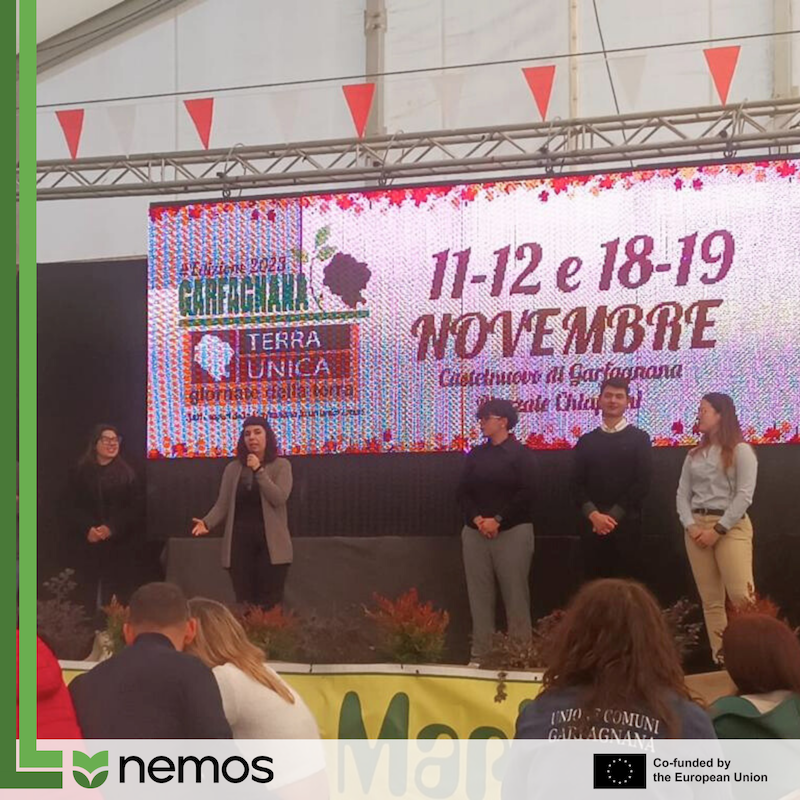
7 March 2024 – The 3rd edition of the initiative How much do you know about sustainability? (Quanto ne sai di sostenibilità?), held between October and December 2023, brought together several students of the Department of Agriculture, Food and Environment (DISAAA-a) of the University of Pisa (UNIPI), Italy, and challenged them to find sustainable, original, innovative and viable solutions for local stakeholders in the agrifood sector.
In the framework of the Erasmus+ co-funded project NEMOS- A new educational approach for the acquisition of sustainability competences through service learning, the DISAAA-a provided a transversal course in collaboration with organisations involved in the valorisation of agrobiodiversity and local cultural heritage in the Garfagnana area (Tuscany).
The course implemented the pedagogical approach of service-learning (learning through community service) for the students to acquire sustainability skills through hands-on experiences aimed at tackling existing sustainability challenges in the territory. Described as a green pedagogy, service-learning allows the university to fulfill its third mission by fostering the active role of students as generators of change and bridges of knowledge between the academy and the territory.
Promoted by lecturers Alessio Cavicchi, Lucia Guidi, Silvia Tavarini, Giuseppe Conte and Andrea Lucchi, and with the scientific and educational support of Annapia Ferrara and Sabrina Tomasi, research fellows involved in the NEMOS project, the initiative saw the participation of 25 students, supported by peer tutors Sofia Panzani, Eugenia Maria Ida Ronga and Alfonso Maria Boccia.
Following a series of seminars – in which non-profit organisations and companies operating in the concerned area presented their activities and related sustainability challenges – on 9-11 November 2023 DISAAA-a’s students, tutors and lecturers experienced a full immersion in the Garfagnana territory to connect with the community and learn first-hand about local realities. The main point of reference for the initiative was the Garfagnana Food and Agrobiodiversity Community (Comunità del Cibo e dell’Agrobiodiversità della Garfagnana), a local network of associations, farms and territorial marketing companies.
The group visited several local actors to understand the variety of production and the sustainable approach adopted to promote the Garfagnana area. Among them: the Braccicorti farmhouse; Alessandro Bravi’s wine cellar; the textile company ARTES – Antica Valserchio; the Apuane Park Authority; and the Museo Italiano dell’Immaginario Folklorico (Italian Museum of Folkloric Imagination). Further stakeholders who took part in the initiative included: Il Corniolo farm; the Union of Garfagnana municipalities; the Regional Germoplasma Bank; the Cascio Sports-Recreational Association; and the Municipality of Camporgiano.
Students worked in teams to formulate their proposals in response to the challenges launched by the organisations involved. The proposals were presented for the first time during the Garfagnana Terra Unica fair held in Castelnuovo di Garfagnana on 11 November 2023. Back at the university, the students further developed their work by carrying out research, in-depth analysis and perfecting their ideas.
At a final event held at the Department of Agriculture, Food and Environment, on 6 December 2023, the students presented their proposals to an audience including lecturers, peers and representatives of local companies and associations.
Dean of the University of Pisa, Riccardo Zucchi was very supportive and interested in the initiative. He highlighted the importance of learning linked to sustainability and appreciated the work done by the DISAAA-a in activating relationships with the territory through the involvement of students. Vice-rector for teaching and representative of the Teaching & Learning Center, Giovanni Paoletti and representative of the Department within COSA – Sustainability Commission, Daniele Antichi recognised that the initiative is perfectly in line with the objectives and activities promoted by the University.
At the same time, attending stakeholders gave a very positive feedback of the experience, acknowledging the students’ ability to listen and get to the heart of the challenges affecting the area, as well as the authentic interest and professionalism demonstrated.
The initiative proved once again how necessary and useful it is for the learning and training of students to break away from academic patterns, creating links between future professionals, universities and local actors. The collaboration between students, lecturers and stakeholders highlighted the importance of putting into practice the theoretical knowledge acquired at the university and the students’ personal skills, with a view to continuous improvement in the field of sustainability and beyond.
Enjoy a short video about the experience at: https://www.linkedin.com/posts/sofia-panzani-6627a924a_exciting-experience-in-the-last-3-days-during-activity-7129120593660063745-FrI9?utm_source=share&utm_medium=member_desktop
The English text is an adapted translation of the original Italian text written by: Sofia Panzani, Eugenia Maria Ida Ronga and Alfonso Maria Boccia.
About the NEMOS Project
The NEMOS project acknowledges sustainability as an increasingly crucial skill for graduate and post-graduate students to tackle important global challenges such as climate change, food waste and the loss of biodiversity in their professional future. Therefore, the project aims to define a new educational model to integrate sustainability competences in the curricula of food-related degrees by means of service learning.
Co-funded by the Erasmus+ programme of the European Union, the NEMOS project is led by the Public University of Navarra and includes the following consortium partners: Technological University Dublin (Ireland); Technological University Graz (Austria); Rhône-Alpes Higher Institute of Agriculture (France); University of Pisa (Italy); and IGCAT.
More information at www.nemosproject.com


